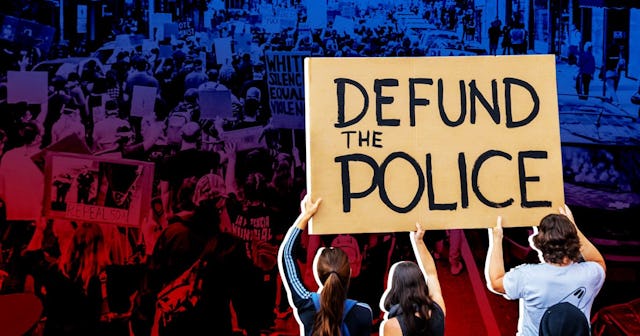I Scoffed At 'Defund Police,' But Now I'm Totally On Board

The first time I heard the slogan “Defund the Police” my immediate reaction was to bristle a little. Fear took over my imagination. Thoughts of a completely lawless and chaotic society filled my head. Images of my house being ransacked flashed in my brain. Who will keep my family safe? Thanks to the meditation habit I gained after losing my mind, I now know how to take a step back from my thoughts, how to get off their worst-case rollercoaster. So, I took a few breaths, got off Fear Mountain, and let curiosity take the reins. I learned more and dug deeper. And honestly, now I’m just plain excited dreaming about the ways that funds could be reallocated to build a better us.
Did you know that estimates show up to 21% of police time is spent responding to people suffering from mental illness? Often when we hear those sirens, see the cars, it’s for somebody who is having a mental health crisis. As someone who has had a mental health crisis—one in which the NYPD had to come and handcuff me on the kitchen floor of my apartment while my toddler and infant were artfully distracted in the bedroom—do you know what I could’ve used instead of armed police officers coming to get me?
De-stigmatization of mental health and proactive support.
So that I understood the data as my belly grew. That 1 in 5 women, and disproportionately women of color, experience a maternal mental health disorder. So that I knew the range of things that could happen—from baby blues to perinatal anxiety, depression, obsessive compulsive disorder, mood disorders, all the way to the 1 in 1000 postpartum psychosis. That it all didn’t look like depression. So that instead of saying I don’t feel like myself for months after returning to work until I completely lost my mind to postpartum psychosis it’d be clear to me and my husband that I should get help and we wouldn’t feel any stigma in doing so. And, hell, maybe even my boss would know about it and think about that in the kinds of projects I was asked to take on the hours I was asked to keep. Yep, that would have been great.
Erik McGregor/Getty
Or better yet if as I was planning to have a baby, I could walk into my local maternal health center (kind of like a local police department, but different) and someone would sit down with me and asked me questions like: what brings you joy? What does self-care look like to you? What kind of support system do you have? So that I was crystal clear on the habits I needed to feel well and experience joy in case I was one of the 1 in 5 and lost myself and couldn’t remember. So that I left with a thoughtful plan to hold me and my partner accountable to keep me well while pregnant and as a new mom. So that I understood where I’d need to lean in on or develop new support systems for my own health and for the well-being of my little one. Of everyone. And in the plan, I could of course account for how federally-mandated paid parental leave would give me the time I needed off work—and my partner as well—so that he could spell me from the baby when I was shell of my former self and so that I could actually fit in self-care and things that brought me joy…a girl can dream.
Or maybe better yet what if meditation was also taught in schools so that from a young age I understood that my mind needed to be trained or it could wreak havoc like a puppy in an empty house with a chewing habit? So that I understood how to watch my thoughts instead of be them. How to prevent being overrun by the thing in my head. A meditation practice that would support me when I was heading into a vulnerable period in a woman’s life: motherhood. Or always.
This was where curiosity took me. It was way more interesting than the ride on Fear Mountain.
And yet as a white woman with means I’m not even the most vulnerable. Not even close.
Up to 50% of women in poverty experience a maternal mental health disorder. Heads or tails. And of course, it’s not just moms. 18.1% of the U.S. adult population, 40 million people, experience an anxiety disorder each year and 6.7%, 16.1 million, a major depressive episode. The possibilities of destigmatizing mental health across the board and providing free support to our most vulnerable are awesome.
And this was just one daydream. There are many other ways that we could reallocate funds to proactively support communities of color and vulnerable populations. To make a better us.
We can’t keep watching our reactive and troubled systems do the same things again and again and pretend it’s shocking. We have to move from fear of leaving what we know to investing in what could be. We have to reimagine. Defund the police.
This article was originally published on